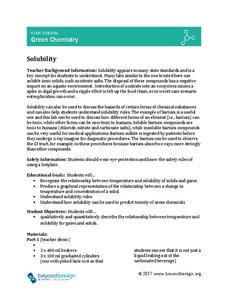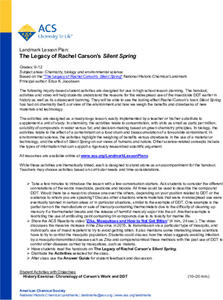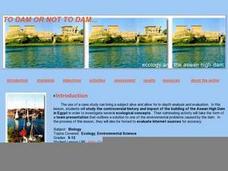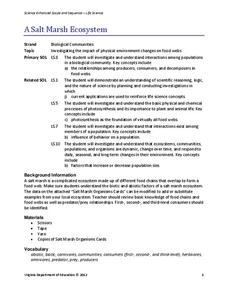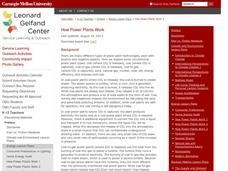Curated OER
WET Science Lesson #5: Pass the Salt Please! (How Road Salt Affects Wetlands)
As an anticipatory set, biologists listen to the story of Ruth Patrick, a scientist who used algae to detect water quality. They observe a demonstration of osmosis and diffusion. In their lab groups, they place Elodea stalks in...
Curated OER
That's Predictable - Stream Side Science
Research the impact that changes in biotic or abiotic factors might have on an ecosystem. Debate for or against the changes and take action in the community. This resource ideally follows stream studies that young ecologists may have...
NOAA
The Sea with No Shores
Some habitats are more bio-diverse than others. Scholars examine an especially diverse environment as groups research different species in a specific ocean habitat. The class then uses their research to create three-dimensional bulletin...
Beyond Benign
Solubility
Enhance your class' ability to understand solubility. Science scholars examine how temperature and concentration affect solubility using an interesting lab experiment. The introduction and procedure also discuss the relationship between...
American Chemical Society
The Legacy of Rachel Carson’s Silent Spring
How do we protect crops and protect the environment at the same time? Using reading materials, learners explore the history of the use of pesticides and biocides. They create a timeline and then explore the current practices.
Curated OER
The Day After Tomorrow: How is the Density of Water Related to Climate Change and Global Warming?
Science learners simulate what happens when ice breaks up and floats on water and how increased pressure on ice causes it to melt faster. They view a clip from the movie, The Day After Tomorrow, and relate their lab activities to what...
Curated OER
To Dam or Not to Dam
Young ecologists explore the Aswan Dam in Egypt via the internet. Each collaborative group is assigned a specific article about the ecological impact of the dam. Then they prepare a presentation to share with the rest of the class. Some...
Curated OER
Fossil Fuels (Part I), The Geology of Oil
Junior geologists work through three mini-lessons that familiarize them with the formation and location of fossil fuels. Part one involves reading about petroleum and where it comes from via a thorough set of handouts. A lab activity...
Curated OER
The Absorption of Solar Energy
Two sequential parts to this lesson introduce your class to the electromagnetic spectrum, the ability to absorb radiant energy, and the pigments in leaves that are responsible for collecting sunlight to be used in the photosynthetic...
Curated OER
Carrying Capacity
Young biologists identify how plants and animals are affected by changes in their ecosystem and environment. The concepts of succession, maintenance of habitats, interrelationships, and adaptation are all discussed. This well-developed...
Curated OER
Cycles and Starting Mealworms
Here is a fascinating lesson about the life cycles of plants and animals, and other cycles found in nature. Learners explore the cycle of the moon, the tides, and other sequences of events in every day life. The big activity is the...
Curated OER
Habitat Basics
First graders get out and explore two different habitats to examine how each one meets the needs of the plants and animals that dwell there. They discuss what they've learned about animal habitats as they explore the outdoor environment....
Curated OER
Using Environmental Models to Determine the Effect of Acid Rain on an Ecosystem
Demonstrate to your middle school science learners how chalk breaks down in a weak acid. Discuss what affects acidic rain might have on ecosystems. Lab groups then choose one of two questions: "How does acid precipitation affect an...
Virginia Department of Education
A Salt Marsh Ecosystem
What a web we weave. Pupils use yarn as the primary resource to create a web depicting the intricacies of a salt marsh ecosystem. They participate in a question and answer session, which leads to an in-depth facilitated discussion about...
Michigan State University
Bug Lyphe!
Introduce ecology classes to biodiversity and interdependence in ecosystems with a PowerPoint presentation. Then, they get up-close and personal with the invertebrate world by collecting insects, classifying them, and graphing their...
Curated OER
Pavement or Dirt?
What are the pros and cons to having either permeable or impermeable materials for building? How do they affect the environment? Use this role-play and the extension activities to get your environmental scientists thinking about the...
Virginia Department of Education
Owl Family Natural Selection
How do genetic mutations within a population lead to future variations? Provide your class with the resources to answer this question and more upon completing an activity on natural selection. The entire class participates in a fun role...
Creative Learning Exchange
Lesson Plans From The Lorax
When it comes to the environment, no variable is constant. Class members graph behavior over time for the thneeds produced over truffula trees chopped down over the course of Dr. Seuss's The Lorax.
WE Charity
High School–Module 5: Transportation Solutions
Planes, trains, and automobiles ... the abundance of today's transportation options comes at a hefty price. Using the fifth and final lesson plan from the WE Are Innovators—High School Modules set, pupils explore how modern...
EduGAINs
Go H2O! Investigating Residential Water Systems
Before your learners excuse themselves to get a drink at the water fountain, prompt them to think about where that water comes from. A middle school science lesson encourages groups to research their community's source of drinking water,...
Odell Education
Plant and Animal Cells
Incorporate multiple facets of the cell into your next high school lab! Through an introduction to cell organelles, class members observe each cell type and draw visuals to further demonstrate understanding of cellular processes in both...
Alliance Theater
The Jungle Book Post-Show STEAM Lesson
An ecosystem is really just the flow of energy through many different living organisms. A study of Rudyard Kipling's The Jungle Book leads to an environmental science activity in which learners study how various factors can affect...
Carnegie Mellon University
How Power Plants Work 3
Double, double toil and trouble, fire burn and cauldron bubble! Find out what drives a turbine to generate electricity and whether or not it has an impact on the environment. A discussion and lecture is divided by a hands-on activity in...
Consortium for Ocean Science Exploration and Engagement (COSEE)
One Ocean: It Matters!
Here is the first of four poignant lessons on how humans and oceans interact, even if people live far from the coast. This particular lesson also examines studies that are taking place in Antarctica of how climate change is affecting the...
Other popular searches
- Environment Science
- Environmental Science
- Environmental Science Games
- Environmental Science Unit
- Ap Environmental Science
- Living Environment Science
- Environmental Science Energy
- Environmental Science Maps
- Environment Science Labs
- Land Use Environment Science
- Environment Science Dilemma
- Environment Science Graphing





